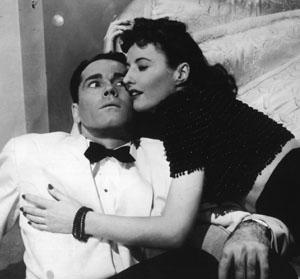
"Let us be crooked, but never common!"
Preston Sturges's The Lady Eve (1941) plays beautifully with screwball comedy tropes. At first glance a typically convoluted romcom, its elegantly crafted silliness makes it a genre standout.Con artist Jean Harrington (Barbara Stanwyck) works with her father (Charles Coburn) to swindle rich passengers on an ocean liner. Their latest mark is heir Charles Pike (Henry Fonda), a snake expert returning from South America. Jean starts to woo Charles into a card game, only to find he's smarter than he looks. That, and Jean falls in love. Charles breaks off the relationship upon discovery, leading Jean to disguise herself as an English noblewoman to get revenge - or win him back.
The Lady Eve plays amusingly with gender roles and identity. Egghead Charles is so wrapped up in reptiles (reading Are Snakes Necessary? while ignoring excited socialites) that he can't connect with humans, a pampered rich boy set against working class crooks. He dreams of nothing more than life "in the company of men...in pursuit of knowledge" and can't fathom female company. His minder Muggsy (William Demarest) sees through Jean's deception yet can't get Charles to listen; nor does his bumptious father's (Eugene Pallette) warnings sink in. Once tempted, Charles can't return to reason.
Jean's life is defined by deception, yet she traps herself in her own treachery. Trying to manipulate Charles, she falls for him, leading to inevitable heartache. The second half turns into a revenge worthy of Shakespearean comedy, with Jean becoming a noblewoman to humiliate Charles. She succeeds in disgusting him with a list of premarital suitors, yet finds she's not so easily rid of him. Feminine deceit and male credulity make for a potent mix, putting Bringing Up Baby's similar storyline to shame.
Sturges stages his gags with measured, deadpan zaniness. Charles' pratfalls and slapstick are measured against verbal banter, with Sturges pairing romance with silliness. Charles' heartfelt proposal is interrupted by a nosy horse; a gushing reconciliation's punctuated with an onlooker burning his fingers. But Eve's most famous scene has Jean cradling Charles in her arms, purring out her desires as Charles stares dumbfounded into space. Held in long take and intimate close up, it's both romantic and ridiculous, a highpoint in cinematic comedy.
Barbara Stanwyck embraces her role with wholehearted, comfortable sincerity. Sultry in one scene, crestfallen in another, she pushes our emotional buttons without forfeiting our sympathy. Henry Fonda counters with deadpan naivety, an endearing straight man to Stanwyck's wiles and Sturges's gags. Charles Coburn contributes a solid supporting turn as Jean's father, with William Demearest, and in other key roles.
The Lady Eve ends on a poignant note, with Jean shedding her deception and embracing Charles. Only by resetting to square one and embracing honesty can they find happiness. Innumerable romantic comedies have copied this arc to diminishing returns; few can match Eve's endearing whimsicality.

